
A souped-up Isetta: the Microlino’s an expensive dream of driving done differently
The Microlino’s the antidote to those two-tonne SUVs clogging up city centres. This cute electric car turns heads and zips through the streets with its stiff suspension. But the fun’s dampened by the price.
Let’s not beat around the bush: the Microlino’s expensive. The long-range version – which my colleague Martin Jungfer and I tested for a few days – costs over 24,000 Swiss francs – that’s the listed price anyway. Whether it’s worth that is up to you. What we can do, though, is tell you what you get for your money.
We are made up of Michael Restin – father, city dweller and driver of a fifteen-year-old Dacia that serves as the family car. Buying a replacement recently fell through because the manufacturer went bankrupt and discontinued its electric vehicle with integrated solar cells in the chassis.
And then there’s Martin Jungfer – also a father, but living in the suburbs, who’s been driving a fully electric car for over four years. Even his small second car – a VW e-Up – runs entirely on electricity.
We covered around 250 kilometres with the Microlino in one week – in the city, through the countryside, even on the motorway.
The design
Children wave, over-60s smile and people often give us a thumbs-up. The Italian-made Microlino wins hearts. It stands out from the crowd of raised SUVs and reminds older people of the BMW Isetta – a scooter-like car built from 1955 to 1962.
Like the Isetta, the Microlino has only one door, which opens forwards and provides access to the passenger area. The rearview mirror and LED headlights are mounted like feelers on the sides of the vehicle, which is only 2.52 metres long. The Microlino sits on four 13-inch wheels, with the front axle wider than the rear. A full-width LED strip with Microlino lettering and indicators runs along the front. The rear also features a light strip integrated into the chassis. This gives the bubble car a modern touch.
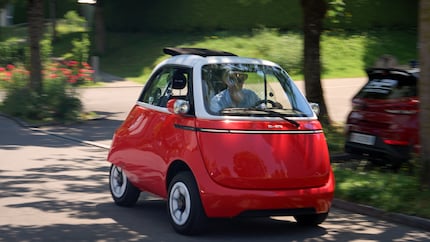
From the outside, the Microlino really grabs attention, standing out from the monotony and «nasty looks» of high-performance models. Inside, a tiny piece of fabric with a Swiss cross and a «rocket car» on the Sport mode button compete for the title of most extravagant detail. The cockpit’s designed to be practical above all else. A boombox replaces the radio, and a small touchscreen controls the heating and air conditioning. It’s a recent addition to the Microlino and was a welcome feature on our hot test days.
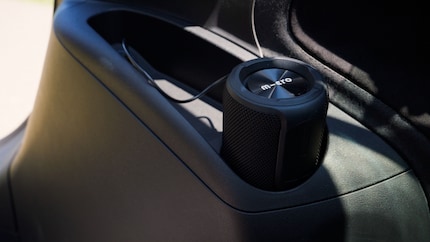
Now, let’s look out beyond the main display behind the steering wheel. In the Microlino, you’re not shielded out on the road. Direct, immediate controls feel better than pressing a touchscreen. One hand movement opens the side sliding window, while a second pushes the folding roof back, revealing a view of the sky. You also adjust the exterior mirrors and seat position manually. That’s no problem, though, everything’s within easy reach in this little cutie without feeling cramped.
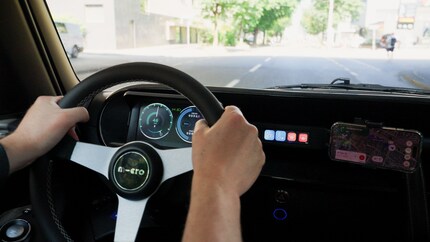
The space on offer
«Comfortably fits two adults and three crates of beer, perfect for a spontaneous trip,» says Microlino. Because that’s a lot of beer for two people, since at least one of them needs to drive, we tested it while completely sober. The experience is exhilarating enough.
When the front flap – which opens via a button hidden on the side of the chassis – swings open for the first time, your jaw will drop a bit. It’s just an unfamiliar sight. Like the fact you have to turn 180 degrees to get in.
The experienced driver reaches for the latch to close the door, swings past the steering column, lands gently on the cushion and locks the front flap. A soft-close function helps, with the door closing the last few centimetres automatically. Sliding the double seat backwards provides ample legroom for even taller passengers. Even at just over 1.90 metres tall, my colleague Martin Jungfer is quite comfortable.
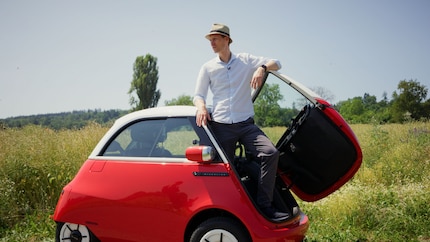
There’s no centre console, and the steering column extends freely into the cabin, so the interior feels spacious. There’s also plenty of headroom for taller passengers. The full-length bench seat only feels a bit tight in terms of width when buckling up.
The boot’s better suited to rucksacks that can be compressed into shape – otherwise, the 230 litres of space under the hatchback’s tailgate aren’t as much use. It’s certainly enough for a few shopping trips, sports bags or laptop bags. A new Fiat 500 fits less with only 185 litres of space, but also four seats.
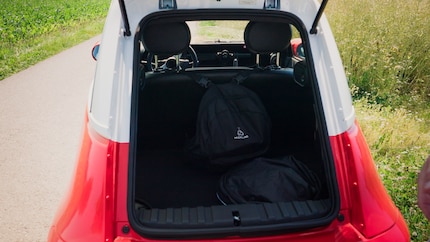
The small Microlino feels quite big when you’re already seated then try to close the open door. This can lead to slight contortions and «dad noises» when you reach to pull the tab.
The driving experience
With a single press on the accelerator, we set off through the city. It’s not just children who love the go-kart feeling. The Microlino’s as manoeuvrable as you’d expect for a tiny car, and nimble enough to go with the flow of traffic or blast ahead at stop lights. The streets suddenly feel much wider, and you realise what vehicle dimensions they were originally designed for. You can even pass oncoming traffic in 30 km/h zones without having to swerve.
And no parking space is suddenly a parking space. There’s always a space that no one else can use – the Microlino fits sideways or backwards into the blue zone. In case you’re wondering: yes, it’s legal to park the Microlino sideways and get out onto the pavement through the door. In general, driving the mini car around town feels free and easy.
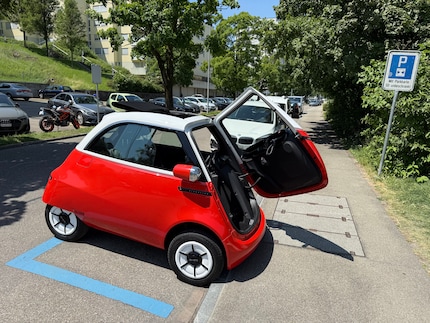
But the go-kart feel also has a downside: the Microlino’s stiff suspension transmits every bump to the occupants’ spinal discs. The electric motor in the rear hums at a high frequency, competing with the driver’s tinnitus. Barely insulated and barely cushioned, the ride’s more pleasant when the boombox plays some summery beats. Then the soundscape matches the easy-going vibe the little car exudes in urban areas.
The Microlino soon starts to struggle as it approaches the city limits. It climbs the hill between Regensdorf and Höngg at a maximum speed of 67 km/h – and the big cars – still mocked in the city – start to roar past again. Pressing the «rocket button» doesn’t help. It just changes the display to an aggressive red, and the little car accelerates even more aggressively.
On flat roads, the experience is less humiliating, since the Microlino also reaches a top speed of 90 km/h, which feels pretty rapid in such a small vehicle. However, you can’t escape the fact that it feels most at home in the hustle and bustle of the city.
Anyone who drives an electric car knows that speed kills range. The Microlino’s no different. Driving on the motorway drains the battery quickly. While boldly accelerating is fun, it also consumes energy – as does running the air conditioning on full blast. In our test, the range was closer to 170 kilometres than the manufacturer’s stated 228.
Comfort
Is the Microlino comfortable? It all depends on how you define comfort. If you’re expecting massage seats, butter-soft suspension or all kinds of assistance systems, you won’t find any. There’s not even power steering or a brake booster. That takes some getting used to at first.
But this tiny car weighs so little that it can easily be tamed with a bit of brawn. It’s all about uncomplicated driving and a breath of fresh or warm air. Everything else is secondary, and even that can feel comfortable: managing basic tasks with a single flick of the wrist, finding parking anywhere or charging in just a few hours from a household socket.
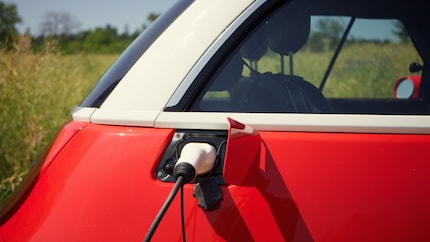
The truth is that the Microlino’s a classic second or third car – one you have to be able to afford. Of course, having the choice to pick the right routes with this mini car is very convenient. The Renault Twizy’s successor – the Mobilize Duo – could offer more comfort in the classic sense. It’ll also be launched as a micro two-seater with a futuristic design rather than a retro feel – including gullwing doors, heated seats, keyless operation and an airbag. However, passengers sit one behind the other, and luggage has to be stowed next to the seats.
Safety
Viewed through the windscreen of other cars, the Microlino looks like a sardine tin that won’t come off well in a crash. Aside from the seatbelts and bodywork, there’s nothing inside to protect you. No airbags, no safety assistance systems. As a light vehicle, it’s in the same category as a quad bike – although you’re at least somewhat better protected. In city traffic, the Microlino doesn’t feel out of place, but longer stretches at top speed on country roads or the motorway are a different matter. One thing’s for sure: the whole neighbourhood will be talking about your new wheels.
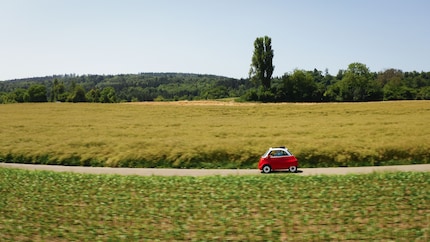
In a nutshell
An automotive statement with charm – unfortunately, quite an expensive one
When the latest Smart car is just under 4.7 metres long and weighs 2.2 tonnes, the Microlino’s a statement. One that requires a certain amount of idealism and a healthy bank account. Imagine if it were mass-produced, the price dropped and people waved to each other through the sardine-tin roof of their cutesy, two-tone cars in the morning.
The idea has as much appeal as the Italian-built Microlino. For most, the dream is dashed by the fact that you can get a lot more car for the same money. At the moment, the purchase price makes it a collector’s item for individualists driven by emotion rather than saving on insurance, tax breaks or low parking fees.
Pro
- Attracts attention (if you like it)
- Very solid finishing
- Relatively large boot
- Easier to find parking
- Fun to drive in the city
- Really charming concept
Contra
- Attracts attention (if you don’t like it)
- Little safety equipment
- Whirring electric motor
- Little to no shock absorption

Simple writer and dad of two who likes to be on the move, wading through everyday family life. Juggling several balls, I'll occasionally drop one. It could be a ball, or a remark. Or both.



